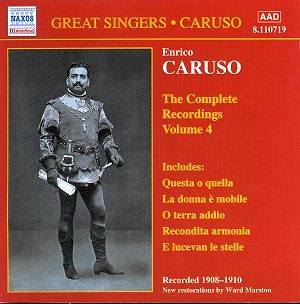| ENRICO CARUSO
THE COMPLETE RECORDINGS VOL 4
|
1 Buzzi-Peccia Lolita 2 Verdi Rigoletto, Act 1: Questa o quella 3 Verdi Rigoletto, Act 4: La donna è mobile 4 Verdi Il Trovatore, Act 3: Ah, sì, ben mio 5 Verdi Il Trovatore, Act 4: Ai nostri monti ritorneremo with Louise Homer, mezzo soprano 6 Verdi Aidi, Act 1: Celeste Aidi 7 Doncieux-Tosti Pour un baiser 8 Russo-Nutile Mamma mia, che vo’ sapè 9 Verdi La Forza del destino, Act 3: O tu che in seno agli angeli 10 Puccini Tosca, Act 1: Recondita armonia 11 Puccini Tosca, Act 3: E lucevan le stelle 12 Verdi Aida, Act 4: La fatal pietra 13 Verdi Aida, Act 4: O terra addio with Johanna Gadski, soprano 14 Goldmark Regina di Saba (Die Köningin von Saba), Act 2: Magiche note 15 Bizet Carmen, Act 2: Il fior che avevi a me tu dato 16 Bizet Carmen, Act 2: La fleur que tu m’avais jetée 17 Meyerbeer Les Hugenots (Gli Ugonotti), Act 1: Bianca al par di neve Alpina 18 Verdi Il Trovatore, Act 4: Miserere: Ah! che la morte ognora with Frances Alda, soprano 19 Verdi Il Trovatore, Act 4: Miserere: Ah! che la morte ognora with Frances Alda, soprano and Metropolitan Opera Chorus 20 Flowtow Martha, Act 1: Solo, profugo, reietto! with Marcel Journet, bass |
Ever since the advent of digital recording there has been a strong desire to use the technology to make available to modern listeners recordings from the past. Indeed, so important has this activity become that the study of performance practice now uses historic recordings as a major resource. Naxos has recently embarked on a large scale reissue of historic recordings on its Naxos Historical sub-label. Amongst the most important of these are the reissues of the complete recordings made by Enrico Caruso. This forth volume covers recordings made from 1908 to the beginning of 1910 and consists largely of favourite excerpts of the performer, centred naturally enough on the works Verdi. Interestingly all of the recordings are orchestrally accompanied, although Caruso recorded several of the tracks on this disc with piano as well.
Caruso’s importance as the first truly great international recording artist is undeniable, and that he was a great operatic tenor of his age is also beyond question. More questionable is just how listenable a disc such as this really is. As a document, of course, it is commendable, and right, that it should be released. As a recording for listening, I remain less convinced. Caruso is never less than whole-hearted in his commitment to the works he is singing, but there are numerous cases where less would undoubtedly have been more, and the regularity of tracks where he sounds likely to explode does get trying if one is listening from beginning to end. Recondita Armonia from Tosca is just one case in point, especially as it is immediately followed by more of the same power intensity in the following track; E lucevan le stelle from Act 4 of the same work. Rather more convincing are those performances where he does restrain himself, the two tracks from Act 2 of Carmen being good examples. Il fior che avevi a me tu dato begins with what can only be described as beautiful singing and La fleur que tu m’avais jetée has much more intensity than mere power.
The really remarkable aspect of this release is the work done by Ward Marston in producing the restoration. Given that these recordings are now nearly a century old, dating from well before the advent electric recording and microphones, the transfer to CD is very impressive. Background noise is minimal, and importantly, consistent from track to track, thus becoming as unobtrusive as could be hoped for. Throughout, the recorded vocal sound works well for Caruso and the bass in the final track, Marcel Journet, if not so successfully for the sopranos that appear with him elsewhere. The orchestral accompaniment is also surprisingly well captured - the basically anonymous ‘Victor Orchestra’ being a lot better than is heard on many such early recordings. Only in the second version of the Miserere from Il Trovatore does the larger ensemble, with chorus as well as orchestra and the two soloists, really suffer from the technology of the day, the chorus drawing the very short straw. Its all fascinating stuff, and the remastering is an admirable example of care, but I think that this remains more one for aficionados than for the general listener.
Peter WellsReview of Volumes 1-3 by Christopher Fifield
